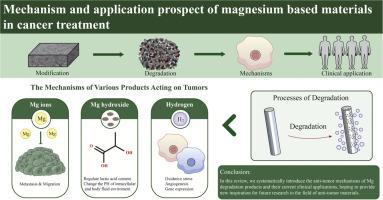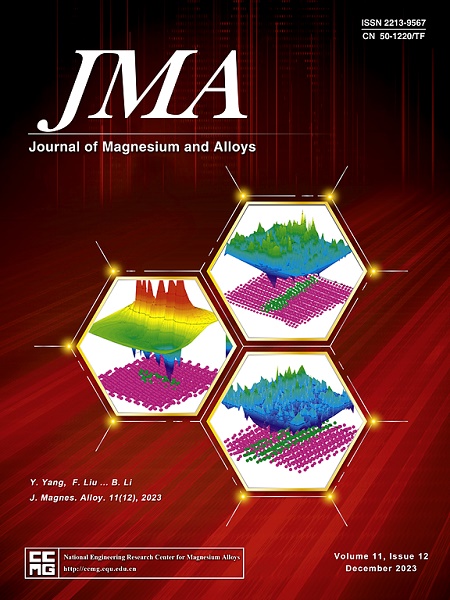镁基材料在癌症治疗中的作用机理及应用前景
IF 15.8
1区 材料科学
Q1 METALLURGY & METALLURGICAL ENGINEERING
引用次数: 0
摘要
镁基材料,包括镁合金,由于其独特的特性,包括生物相容性、生物可降解性和调节肿瘤微环境的能力,已成为一类有前途的可生物降解材料,在癌症治疗中具有潜在的应用前景。镁合金的主要降解产物是镁离子(Mg2+)、氢(H2)和氢氧化镁(Mg(OH)2)。镁离子可通过介导炎症反应和氧化应激、维持基因组稳定性、影响肿瘤微环境等途径调节肿瘤生长和转移。同样,氢可以通过抗氧化和抗炎特性抑制肿瘤的发生。此外,Mg(OH)2可以改变微环境的pH值,影响肿瘤的发生。可生物降解镁合金在临床应用中具有多种功能,包括但不限于骨固定、冠状动脉支架和药物载体。然而,与镁基材料相关的抗肿瘤机制尚未得到彻底的研究。本文综述了以镁为基础的癌症治疗的现状。它强调了作用机制,确定了必须解决的挑战,并讨论了肿瘤应用的前景。本文章由计算机程序翻译,如有差异,请以英文原文为准。


Mechanism and application prospect of magnesium-based materials in cancer treatment
Magnesium-based materials, including magnesium alloys, have emerged as a promising class of biodegradable materials with potential applications in cancer therapy due to their unique properties, including biocompatibility, biodegradability, and the ability to modulate the tumor microenvironment. The main degradation products of magnesium alloys are magnesium ions (Mg2+), hydrogen (H2), and magnesium hydroxide (Mg(OH)2). Magnesium ions can regulate tumor growth and metastasis by mediating the inflammatory response and oxidative stress, maintaining genomic stability, and affecting the tumor microenvironment. Similarly, hydrogen can inhibit tumorigenesis through antioxidant and anti-inflammatory properties. Moreover, Mg(OH)2 can alter the pH of the microenvironment, impacting tumorigenesis. Biodegradable magnesium alloys serve various functions in clinical applications, including, but not limited to, bone fixation, coronary stents, and drug carriers. Nonetheless, the anti-tumor mechanism associated with magnesium-based materials has not been thoroughly investigated. This review provides a comprehensive overview of the current state of magnesium-based therapies for cancer. It highlights the mechanisms of action, identifies the challenges that must be addressed, and discusses prospects for oncological applications.
求助全文
通过发布文献求助,成功后即可免费获取论文全文。
去求助
来源期刊

Journal of Magnesium and Alloys
Engineering-Mechanics of Materials
CiteScore
20.20
自引率
14.80%
发文量
52
审稿时长
59 days
期刊介绍:
The Journal of Magnesium and Alloys serves as a global platform for both theoretical and experimental studies in magnesium science and engineering. It welcomes submissions investigating various scientific and engineering factors impacting the metallurgy, processing, microstructure, properties, and applications of magnesium and alloys. The journal covers all aspects of magnesium and alloy research, including raw materials, alloy casting, extrusion and deformation, corrosion and surface treatment, joining and machining, simulation and modeling, microstructure evolution and mechanical properties, new alloy development, magnesium-based composites, bio-materials and energy materials, applications, and recycling.
 求助内容:
求助内容: 应助结果提醒方式:
应助结果提醒方式:


